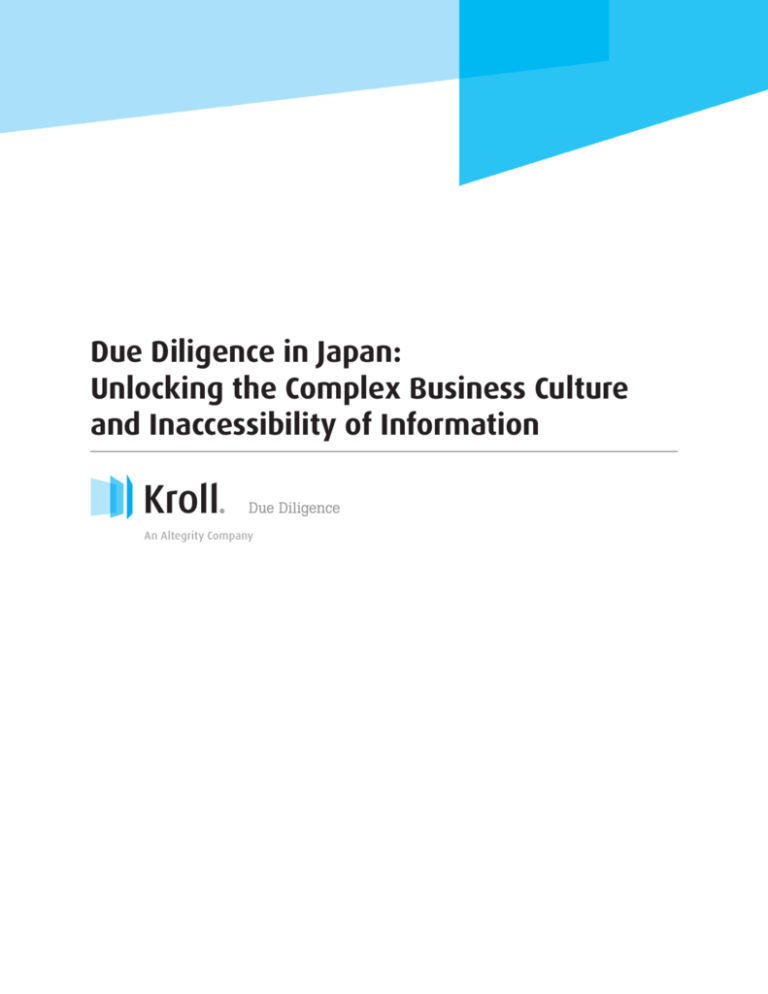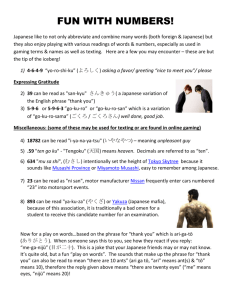
Due Diligence in Japan:
Unlocking the Complex Business Culture
and Inaccessibility of Information
Due Diligence
An Altegrity Company
Due Diligence in Japan: Unlocking the Complex Business
Culture and Inaccessibility of Information
In 2008, in an effort to root out pervasive organized crime and corruption in the Japanese financial sector,
Japan’s Securities and Exchange Surveillance Commission compiled a watch list of hundreds of companies
suspected of maintaining links to organized crime groups, or yakuza. The list reportedly included more
than 200 entities, all publicly traded, many of which were described as “household names” in Japan. In
response, the Osaka Stock Exchange established a new screening system to detect companies which have
yakuza links or “dirty money” on their shareholder registries. Authorities have also made attempts to root
out organized crime-backed auditing firms, which sign off on false accounts, manipulating the earnings of
affected entities.
Despite these problems, Japan boasts the world’s second largest economy in terms of nominal gross domestic
product and one of the world’s largest stock markets. Savvy international investors can find significant
business opportunities there. As noted above, however, Japan continues to face difficulties regarding
organized crime, corruption, and money laundering. In addition, the country’s insular and private nature
often means that most corporate information is available only in Japanese and is not widely accessible to the
public. A thorough due diligence investigation can help to mitigate these risks and provide vital information,
ensuring that potential pitfalls are exposed before a transaction is undertaken.
Organized Crime
One of the most critical issues facing international investors in Japan is a pervasive problem with organized
crime groups and other anti-social forces. Organized crime groups have been increasing in Japan since
the Japanese government enforced an organized crime law in 1991. Following the enactment of this law,
it became difficult for organized crime groups to operate in traditional ways, thus forcing them to adopt
“normal” business activities. Many of these front companies then expanded their operations internationally
in attempts to avoid prosecution under Japanese anti-organized crime laws. In addition to their pervasive
nature, organized crime groups have been known to participate in blackmail and extortion, often causing
formerly legitimate businesses to become involved with organized crime. These groups also hold some
influence over the law enforcement and journalism communities. Even if legitimate organized crime ties
are widely known or established, Japanese media outlets will often not print the information due to fear
of retribution and lawsuits from organized crime-affiliated entities. Certain organized crime groups have
also operated with the unspoken approval of law enforcement authorities, who believe that by allowing
certain activities, including gambling and sex businesses, to be run by yakuza, the groups could be closely
monitored.
A thorough and far-reaching due diligence investigation will often be able to identify rumors and evidence
of organized crime ties with a seemingly legitimate entity. By investigating a company’s shareholders and
investors, evidence of possible criminal ties may come to light. While a company itself may not have direct
links to yakuza or other anti-social groups, a deep look into its business associates could reveal otherwise.
Japanese Language Searches
Unlike the custom adopted by many countries, information from Japanese media sources is not readily
available in English. Even an English-only media review of a large Japanese entity may return little
information. Thus, comprehensive checks in Japanese of media and regulatory sites are necessary to develop
-1-
a complete picture of a subject’s reputation and profile. A thorough media scan in Japanese can also help
to identify pertinent blog and gossip sites, which may contain useful information. As the government and
police forces influence much of Japan’s mainstream media, checks of Internet sites can return valuable
reputational information regarding a subject that may not otherwise be available. Additionally, and as noted
above, fear of lawsuits and retribution has had the negative effect of stifling mainstream press coverage of
companies with known organized crime links.
In addition, regulatory and corporate registration checks are of the utmost importance. These basic searches
can often identify fake corporate registration numbers—a tactic frequently used by illegal financial firms.
Thus, obtaining information regarding a company’s directorship and shareholding structure is vital to
understanding the legitimacy of a Japanese company. As this information is not typically readily available
to the public, a due diligence investigation utilizing discreet local source inquiries can assist clients in
obtaining these valuable details.
Checks of regulatory databases, including the Financial Services Agency, can uncover violations of financial
regulations and norms. These checks can also confirm the membership of entities and individuals with
various financial associations and regulators. These checks generally must be conducted in Japanese, as
information is typically not translated into English.
Litigation Searches
Due to strict privacy laws in Japan, there is no public database for civil and bankruptcy litigation searches.
These records can only be accessed by authorized personnel and licensed investigative firms, thus
underlining the need for enlisting the assistance of a trusted due diligence firm. As criminal records are not
available to any third party, a comprehensive due diligence check can identify allegations and rumors of
criminal activity, even in the absence of access to official criminal histories.
A detailed due diligence investigation can help to unlock the sometimes complex Japanese business
culture. While the general inaccessibility of regulatory and corporate information, tough privacy laws, and
far-reaching organized crime networks can stifle potential business transactions, these obstacles can be
overcome through comprehensive Japanese language media / Internet and regulatory checks and local
source inquiries.
For more information, call, email or visit us online.
877.230.9082
edd-contactus@kroll.com
www.kroll.com
Certain Altegrity companies provide investigative services. State licensing information can be found at www.altegrity.com/compliance.
Copyright © 2011 Kroll. All rights reserved.
Due Diligence in Japan WP 04 040811PR









